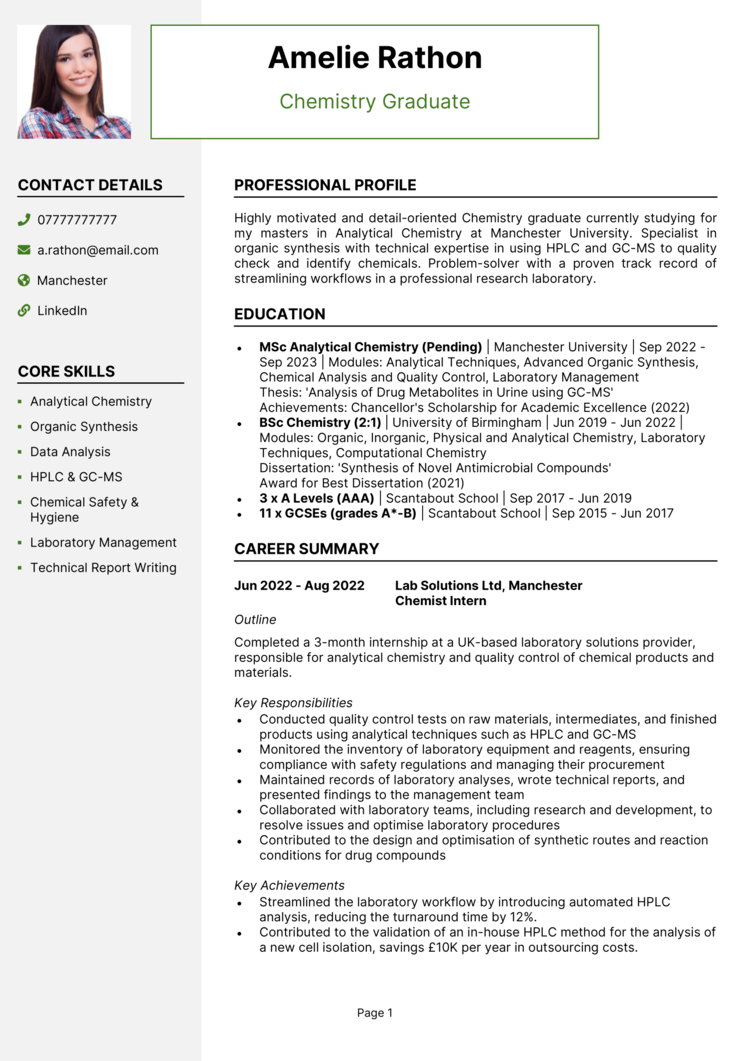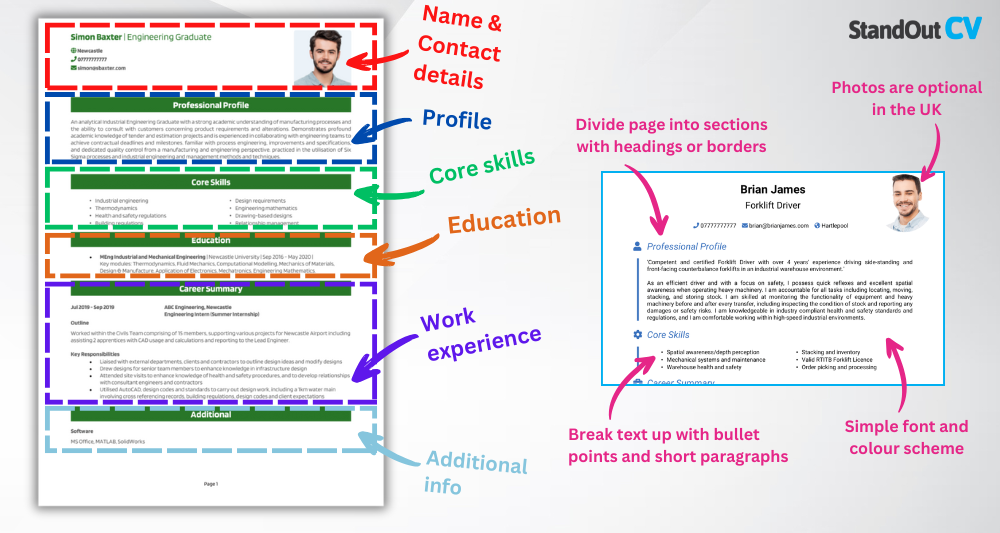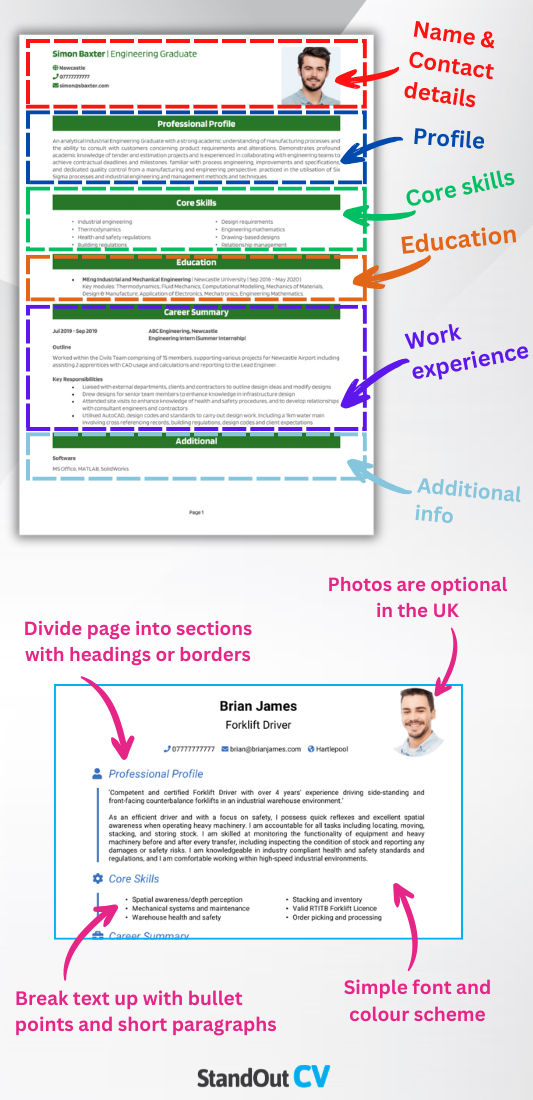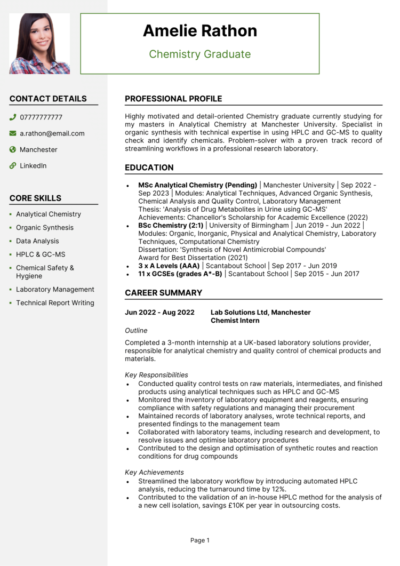You’ve handled dangerous reactions, memorised half the periodic table, and survived more late-night lab sessions than you care to admit. Now comes the next test – the job market.
Unfortunately, “skilled in titration” won’t mean much if your CV doesn’t land the first reaction: interest.
This guide and its Chemistry Graduate CV example will help you present your chemistry background in a clear, compelling way. You’ll learn how to translate lab-based strengths into workplace-ready skills.
Chemistry Graduate CV sample

How to write your Chemistry Graduate CV
Discover how to create a quality Chemistry Graduate CV with this simple step-by-step guide.
You’ve built a strong foundation in scientific analysis and problem-solving – but now you need to show how that makes you an asset in the workplace.
This guide takes you through every part of writing a CV, from formatting it cleanly to how to phrase your project experience and technical skills in a way that employers actually care about.
Structuring and formatting your Chemistry Graduate CV


In chemistry, structure matters – and it’s no different when it comes to your CV. A well-organised document helps recruiters quickly identify your key achievements, qualifications, and work history without combing through a messy reaction mix of text. Following the below tips will make sure recruiters recognise your value, and your potential.
Here’s the layout to follow:
- Name and contact details – Place your name and personal details prominently at the top of your CV for quick access. Adding a photo is up to you.
- Profile – Open with a compelling overview of your skills, experience, and career goals.
- Core skills – List your key abilities in this section, focusing on those that will be most relevant to the job.
- Work experience – Provide a detailed breakdown of your work history, starting with the most recent job first.
- Education – List your qualifications, expanding on specific modules or courses which make you the right fit.
- Additional info – Use this optional space for relevant hobbies and interests or personal pursuits that enhance your application.
Keep each section clearly labelled with bold headings, and use bullet points to break down dense walls of text. Stick to a clean, professional font – this isn’t the time for quirky formatting. Aim for a maximum length of two pages, so everything is relevant and skimmable (remember, your thesis is done and out the way – no need to write another one). Clear formatting signals attention to detail, which is something every lab (and hiring manager) values.
The best way to write a Chemistry Graduate personal statement


Your personal statement (or CV profile) sits right at the top of your CV, so make it count. It’s your first opportunity to introduce yourself and express what you bring to the table. Rather than just stating that you’ve studied chemistry, focus on your areas of strength, any relevant technical or research experience, and what kind of role or field you’re aiming to enter.
Keep it sharp and just reactive enough to spark interest. Recruiters should get a quick sense of what you’ve studied and how you’ve applied it, and why it matters in a working environment.
Chemistry Graduate CV profile examples
Profile 1
Motivated Chemistry Graduate with a First Class BSc in Chemistry and strong experience in analytical lab work. Proficient in using spectroscopy, titration, and chromatography techniques. Completed a dissertation on sustainable polymer chemistry and now seeking a role in R&D, quality assurance, or laboratory operations.
Profile 2
Detail-focused Chemistry Graduate with a BSc (Hons) and hands-on training in both academic and industrial labs. Skilled in interpreting chemical data, preparing solutions, and maintaining strict safety standards. Known for precision, organisation, and collaborative working in lab-based environments.
Things to have in your Chemistry Graduate CV profile
Include the following:
- Where you studied – Briefly mention the institution and course to give an academic context to your experience.
- Your top qualifications – Highlight your degree, any special modules, or academic honours.
- Essential skills – Mention practical and lab-based skills that have real-world applications.
- Field of interest – Indicate whether you’re targeting pharmaceuticals, education, R&D, data analysis, or another area.
- Value delivered – Mention where your knowledge or research has made a tangible impact – such as lab placements, group projects, or independent study.
How to present your core skills section properly


This section gives recruiters a quick summary of what you can do – but keep it sharp and relevant. Focus on practical, hard CV skills you’ve picked up from your degree, lab work, or internships.
That means analytical chemistry, lab safety, instrument handling, data interpretation, scientific writing, and statistical analysis – not filler phrases like “strong work ethic” or “motivated graduate.” Use the job advert as your guide, and highlight only the skills that would catch a recruiter’s eye in your target industry.
Key skills that make a Chemistry Graduate CV stand out
- Analytical Techniques and Instrumentation – Using tools such as spectroscopy, chromatography, and titration to analyse chemical compounds and mixtures.
- Laboratory Experimentation – Conducting chemical experiments with precision, following standard procedures and maintaining accurate records.
- Chemical Safety and Hazard Management – Handling hazardous substances safely and adhering to COSHH regulations and lab safety protocols.
- Data Analysis and Interpretation – Interpreting experimental data using statistical tools and drawing conclusions based on scientific evidence.
- Report Writing and Documentation – Producing detailed lab reports and research papers that communicate findings clearly and concisely.
- Chemical Synthesis and Reaction Monitoring – Designing and performing synthesis of compounds, monitoring reactions, and purifying products.
- Use of Modelling and Simulation Software – Applying software tools such as ChemDraw or molecular modelling programmes to support research and analysis.
- Knowledge of Organic, Inorganic, and Physical Chemistry – Applying core principles across disciplines to understand and solve chemical problems.
- Quality Control and Assurance Understanding – Assisting in the testing of substances to ensure they meet quality and regulatory standards.
- Collaborative Research and Project Work – Contributing to team-based research projects and working effectively with cross-disciplinary teams.
Presenting your education history


Your education is likely to be the strongest part of your CV as a recent graduate, so give it the attention it deserves. Start with your degree, the university, and your dates of study. Expand on any key modules, research projects, or dissertation titles that relate to the field you’re applying for.
If you’re short on work experience, you can briefly include academic achievements or group work that demonstrates your soft skills or leadership.
Example education sections
Education 1
First Class BSc (Hons) Chemistry | University of Birmingham | 2020–2023
Modules included Organic Synthesis, Analytical Chemistry, and Instrumental Techniques. Completed a final-year project on the development of biodegradable polymers, receiving a first.
A-Levels (AAB) | Halesowen Sixth Form College | 2018–2020
Subjects: Chemistry, Physics, Mathematics
10 GCSEs (A*–B) | Kingsmead School, Birmingham | 2016–2018
Education 2
Upper Second Class BSc (Hons) Chemistry with Medicinal Chemistry | University of Reading | 2019–2022
Modules included Drug Design, Spectroscopy, and Pharmaceutical Chemistry. Dissertation focused on the synthesis of potential anti-cancer agents targeting enzyme inhibition.
BTEC Level 3 Extended Diploma in Applied Science (D*D*D) | South Thames College | 2017–2019
Included laboratory skills, chemical reactions, and scientific reporting units.
9 GCSEs (A*–C) | Chestnut Grove School, London | 2015–2017
What to include in your education section
For each qualification, add the following info:
- Qualification & organisation – Name the institution (e.g. the university) where you earned each qualification.
- Dates studied – Provide the beginning and end month and year.
- Extra details – Expand upon specific modules which you think are especially pertinent to the jobs you’re applying for.
Best qualifications for a Chemistry Graduate
- BSc Chemistry or MChem – A solid academic foundation in core chemical principles
- HND or Foundation Degree in Chemical Sciences – Offers applied knowledge for lab-based roles
- Laboratory Safety Certification – Vital for lab work, showing safety and compliance awareness
- Good Laboratory Practice (GLP) Training – Recognised lab-standard training for industry roles
- Data Analysis Certificates (e.g. Excel, Python, R) – Valuable for roles involving statistics or technical reporting
How to present your work experience in your CV


This is where you show how your knowledge has been put into practice – in labs, internships, part-time jobs, or group projects. Even non-chemistry jobs are worth including if they demonstrate transferable skills such as teamwork or time management.
List your roles in reverse chronological order. For each one, start with a short paragraph outlining your role and where you worked. Then break down your responsibilities and achievements using bullet points. Mention any technical tools and lab techniques you used during your work experience.
Keep it focused on how you added value – even in an academic setting.
How should you list jobs on your Chemistry Graduate CV?

- Outline – State the context of your job or placement and describe your role – whether in a lab, retail environment, or university project.
- Responsibilities – Use action words like “conducted” and “documented.” For example: “conducted experiments using spectrometry equipment” or “documented results in line with GLP standards.”
- Achievements – Highlight specific results or contributions – this could be project outcomes, improved accuracy, faster analysis, or recognition for your work.
Example jobs for Chemistry Graduates
Lab Technician | Solvaxa Analytical Services
Outline
Supported day-to-day testing and analysis for a chemical testing laboratory specialising in food and environmental safety.
Responsibilities
- Prepared reagent solutions and calibrated analytical instruments
- Conducted pH, titration, and spectrophotometry testing under supervision
- Documented results accurately and updated lab records
- Ensured cleanliness of workstations and adhered to COSHH guidelines
- Collaborated with senior chemists to support investigative testing
Achievements
- Maintained 100% data accuracy in logged test results over 6 months
- Reduced prep time for daily assays by reorganising chemical inventory
- Commended by supervisor for consistent lab safety compliance
Research Intern | BioTechChem Ltd
Outline
Contributed to a 12-week research programme in a pharmaceutical R&D lab focusing on early-stage drug formulation and compound synthesis.
Responsibilities
- Assisted with the synthesis of organic compounds for lab testing
- Maintained detailed lab notebooks and recorded yields and observations
- Conducted melting point analysis and TLC for purity checks
- Followed SOPs and supported senior researchers in compound evaluation
- Participated in weekly group meetings and presented updates
Achievements
- Produced lab data later included in a published research paper
- Improved reaction yield on one synthesis process through lab optimisation
- Completed all project milestones ahead of schedule with minimal supervision
Additional info


For chemistry graduates, the Additional Information section is a great way to show who you are outside the lab. It allows you to highlight interests, achievements, and independent projects that reflect attention to detail, analytical thinking, creativity, and scientific curiosity – qualities that employers in research, industry, and beyond truly value.
Good additional info for Chemistry Graduates
- Hobbies – Focus on activities that demonstrate observation, focus, or problem-solving – like baking, chess, reading science fiction, or photography. These can hint at transferable skills for lab and analytical work.
- Awards and Achievements – Recognition for academic performance, competitions, or research presentations shows you’re driven, capable, and passionate about your subject.
- Extracurricular Activities – Involvement in science clubs, mentoring, or society roles shows teamwork and initiative beyond your coursework.
- Personal Projects – Anything from science communication to home chemistry demos or data visualisation projects helps demonstrate curiosity and independent learning.
Additional info example
Additional info
Hobbies
Home experiments – Conduct small-scale chemistry demonstrations (safely) to explore concepts like acid-base reactions and crystallisation.
Baking – Enjoy experimenting with recipes and ingredients, combining creativity with precision and timing.
Science fiction reading – Explore how chemistry and technology are imagined in different futures, sparking curiosity and creative thinking.
Awards and Achievements
Top mark in final-year research project – Achieved the highest score in a group of 30 for an investigation into green catalysis techniques.
Chemistry Society recognition – Acknowledged for contributions to organising outreach events and supporting underclassmen.
Extracurricular Activities
Chemistry Society treasurer – Managed budgeting and event planning, ensuring smooth operation of student-led activities.
Open day ambassador – Represented the chemistry department during university recruitment events, answering questions from prospective students and parents.
Personal Projects
Periodic Table blog – Created a blog where each post explores a different element, combining chemistry knowledge with writing and communication.
Self-taught Excel modelling – Built spreadsheets to simulate chemical kinetics data, improving quantitative and visual analysis skills.





